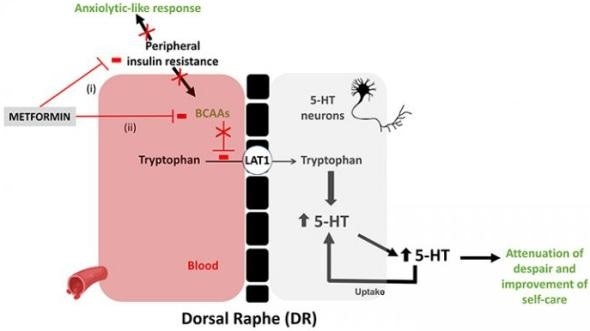The antidiabetic medication metformin reduces anxiety-like behaviors in male mice by increasing serotonin availability in the brain, according to a study published in JNeurosci. These findings could have implications for the treatment of patients with both metabolic and mental disorders.

This is a model underpinning the effects of metformin on depressive symptoms in mice fed a HFD. Credit: Zemdegs et al., JNeurosci (2019)
People with diabetes have an increased risk for mood disorders such as depression. Although the mechanisms underlying the relationship between insulin resistance — the precursor to diabetes — and depression are not known, studies suggest the neurotransmitter serotonin may be the culprit.
In mice raised on a high fat diet, Bruno Guiard and colleagues demonstrate that the insulin-sensitizing drug metformin reduces levels of amino acids that impair the entry of tryptophan in the brain and thereby limit its conversion into serotonin. The drug’s antidepressant-like effects were accompanied by improved neurotransmission in the hippocampus. The researchers achieved similar effects by reducing the amount of so-called branched chained amino acids in the diet.
Source:
Society for Neuroscience
Journal reference:
Zemdegs, J. et al. (2019) Metformin promotes anxiolytic and antidepressant-like responses in insulin-resistant mice by decreasing circulating branched-chain amino acids. Journal of Neuroscience. doi.org/10.1523/JNEUROSCI.2904-18.2019.